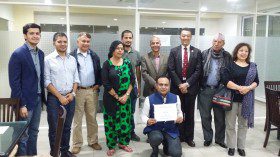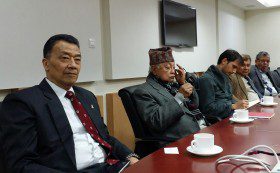The Harvard Club of Nepal (HCN), a group of Harvard alumni, has recently been reactivated. The group’s goal is to serve as an interactive platform for proactive discussions on topical issues of national and global importance, as well as to promote professional networking among the alumni community in Nepal.
HCN has just launched its Talk Series, to take place in Kathmandu on the 10th of each month, with a prominent speaker who will give a talk on an issue of contemporary interest and significance.
On February 10, 2015, HCN hosted its first talk in the series, about the current constitution-making imbroglio in Nepal.
Two newspaper editors (both member of HCN) Prateek Pradhan of Nagarik vernacular daily and Subhash Ghimire of Republica English daily presented their views on the current political situation, and discussed the role that media could play in resolving the chaos of constitution-making. Bhojraj Pokharel, Coordinator of HCN and former Chief Election Commissioner, moderated the program.
Pradhan said political parties should follow the verdict from the elections of the Constituent Assembly in November 2013. The ruling coalition, and two major parties with the majority mandate from the election, the Nepali Congress and CPN (UML), are in favor of drafting the constitution with two-thirds majority in the House. These two parties, with the support of some smaller parties, will be able to garner the needed votes.
However, the UCPN (Maoist), which waged a decade-long insurgency that ended with the Comprehensive Peace Accord in 2006, is opposed to the majority-imposed constitution, and the Maoists are supported by Madheshi parties. The crux of the issue is about the creation of a federal structure in Nepal. The opposing group wants federalism on the basis of ethnic identity, whereas the ruling coalition wants to have a restructuring of the state on the basis of larger identity of the nation and nationalities.
Pradhan also said that the parties, emerging from a violent past, would not agree on anything unless the government shows strength and confidence in enforcing the rule of law. Republica editor Subhash Ghimire said that the political mandate should go to the people. Since Nepali people have largely shown confidence in the current ruling coalition, it would go against the people’s verdict to claim that the constitution has to be promulgated only through consensus. Ghimire, however, added that it would be a welcome change if the political parties came up with a new constitution with a consensus.
While moderating the session, Bhojraj Pokharel said that the verdict of the people would be stronger if it could come to a consensus. He also explained that the country should not fall back into a conflict between political parties after having just come out of a different conflict.
After the talk, audience members were able to ask questions, including Himalaya Sumsher JBR, the first governor of Nepal’s Central Bank, Roop Jyoti, former minister and a renowned industrialist, Krishna Gyawali, former Secretary of Nepal government, Sanat Basnet, former Inspector General of Armed Police Force, Dr. Genoveva Hernandez Uriz, Delegation of European Union in Nepal’s head of Political Section, and Astha Thapa, an entrepreneur.
In March, Dr. Swarnim Wagle, National Planning Commission Member and HNC member, will give a talk on “Igniting Nepal’s Latent Fortunes.”
For questions about the Harvard Club of Nepal, please contact Bhojraj Pokharel, bhojrajpokharel@yahoo.com.


